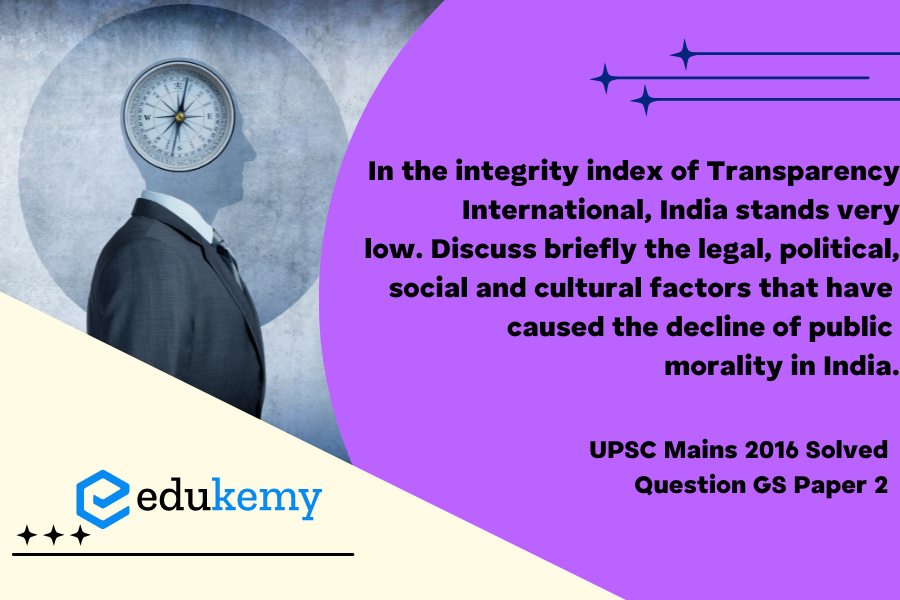India’s unsettling position on Transparency International’s integrity index underscores a multifaceted decline in public morality, influenced by a complex interplay of legal, political, social, and cultural factors. Legally, gaps in enforcement and accountability mechanisms have allowed corruption to persist, eroding the ethical fabric of the nation. Politically, the nexus between power and corruption has permeated various levels, with instances of high-profile scandals casting a shadow on the government’s commitment to transparency and ethical governance. Socially, a historical tolerance for corruption, coupled with economic disparities, has normalized unethical practices in both public and private spheres. Additionally, cultural factors contribute significantly to this decline, as ingrained practices of favoritism and nepotism often override merit-based systems. The hierarchical nature of Indian society, where power dynamics often trump ethical considerations, exacerbates the erosion of public morality. Addressing this issue requires a comprehensive approach that involves legal reforms, political will for stringent enforcement, social awareness campaigns, and a cultural shift toward valuing integrity. Only through a concerted effort across these domains can India hope to reverse the trend and rebuild a foundation of public morality that aligns with principles of transparency and ethical conduct.
Tag: Appointment to various Constitutional posts, powers, functions and responsibilities of various Constitutional Bodies.
Contents
Decoding the Question:
- In the Introduction, try to start by writing about the status of corruption in India.
- In Body, discuss various legal, political, social, and cultural factors that have caused the decline of public morality in India.
- In Conclusion, try to suggest a way forward to cope up with corruption.
Answer:
Corruption is a global phenomenon and it is omnipotent. It has progressively increased and is now rampant in our society. As the nation grows, the corrupt also grow to invent new methods of cheating the government and public. India was placed at 76th position out of 168 countries with a score of 38 out of 100 in Transparency International’s Corruption Perceptions Index 2015. The causes of corruption are many and complex.

Causes Behind Decline of Public Morality in India:
Political and Legal Cause:
- Lack of enforcement capacity and regulatory complexity are deep causes of India’s institutions. Complex laws and procedures deter common people from seeking help from the Government.
- Many laws and rules have become obsolete and breed corruption, long delays in judicial proceedings and less severity of punishment, multiple investigative agencies with overlapping jurisdiction such as Lokpal, CVC, CAG, etc.
- Those in the hierarchy vested with disciplinary powers shirk their duties and are unwilling to use their powers against corrupt practices.
- The emergence of political elites who are more self-interest-oriented rather than nation-oriented programs and policies.
- The Commonwealth Games scam, 2G spectrum scam, etc., showed an exponential increase in corruption.
Economic causes:
- Artificial scarcity created by people with mal-intentions wrecks the fabric of the nation’s economy.
- The vast size of the population coupled with widespread illiteracy and poor economic infrastructure lead to increasing inequality that causes corruption in public life.
- In a highly inflationary economy, low salaries of government officials compel them to resort to corruption.
Socio-cultural causes:
- There is the normalization of corruption in the society.
- There is a long history of corrupt practices in India from ancient times, which was strengthened during Mughal and British times in the form of Baksheesh and gifts etc.
- There is no social outcry to prevent corruption; Sanskritization of corruption, social hierarchy, bribery, and lack of moral education for the children promote selfish tendencies among people.
- With the emergence of the modern job-oriented education system and the decreasing role of the family in giving ethical values due to industrialization, westernization, and urbanization.
Corruption erodes trust, weakens democracy, hampers economic development, and further exacerbates inequality, poverty, social division, and the environmental crisis. India needs to follow a zero-tolerance policy to cope with corruption. The government can also strengthen its regulatory and monitoring system, increase the participation of people, promote moral education in schools, etc., to reduce corruption.
In case you still have your doubts, contact us on 9811333901.
For UPSC Prelims Resources, Click here
For Daily Updates and Study Material:
Join our Telegram Channel – Edukemy for IAS
- 1. Learn through Videos – here
- 2. Be Exam Ready by Practicing Daily MCQs – here
- 3. Daily Newsletter – Get all your Current Affairs Covered – here
- 4. Mains Answer Writing Practice – here


